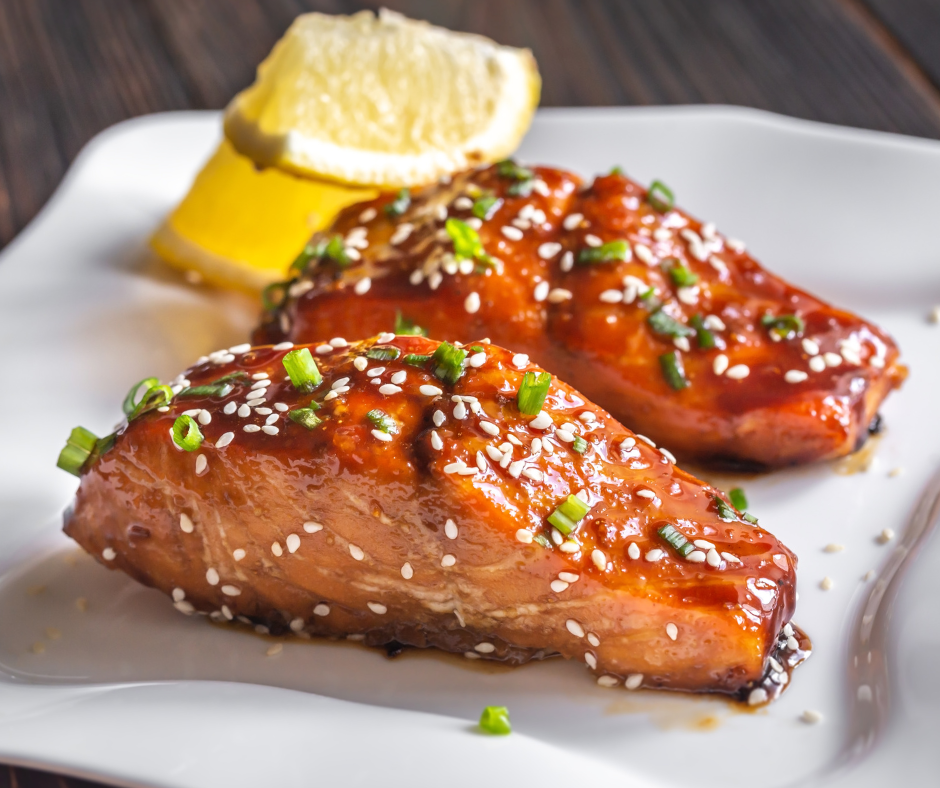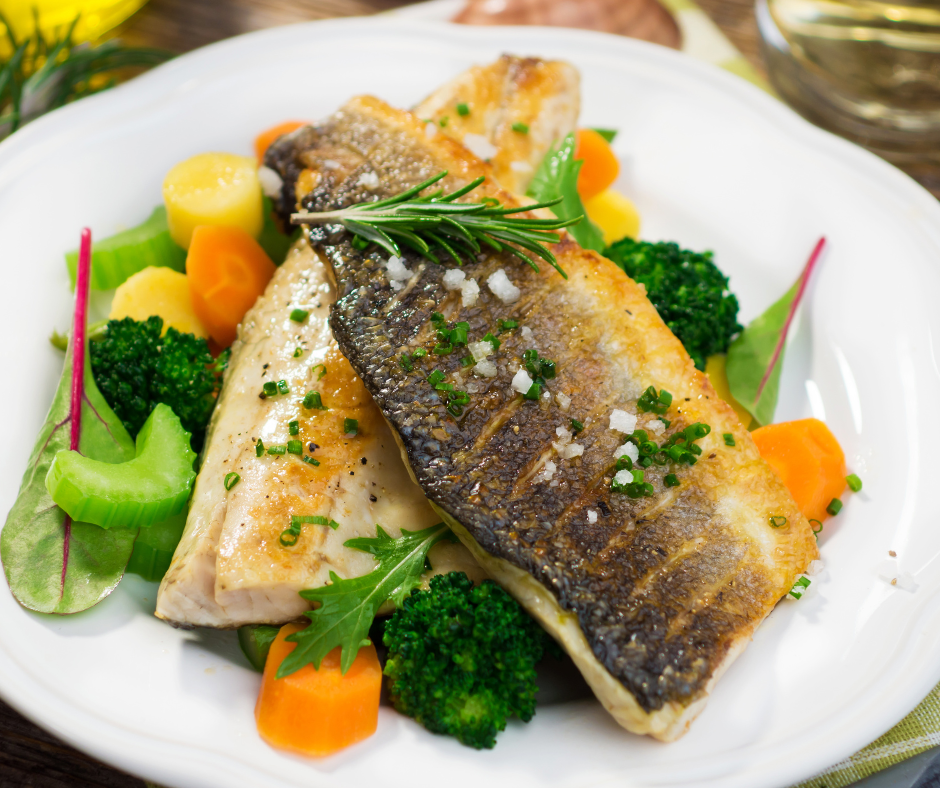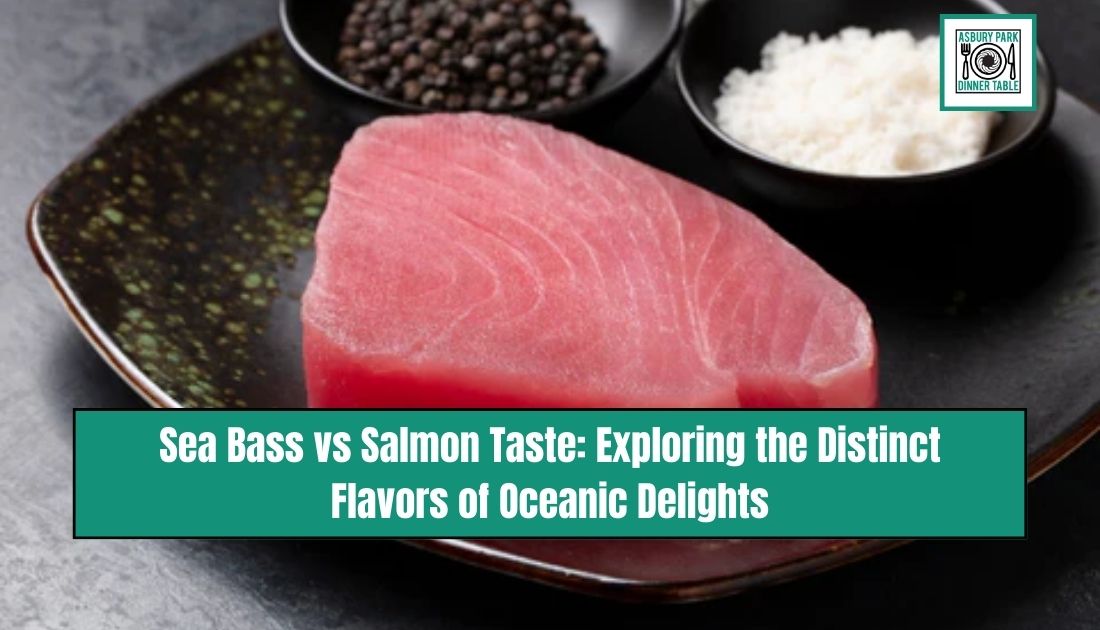Introduction
Regarding gourmet dining and health-conscious meal choices, sea bass and salmon have long been at the center of a debate. These two aquatic delicacies are known for their exquisite flavors, versatile culinary applications, and impressive nutritional profiles. In this article, we will explore the comparison of Sea Bass vs Salmon Taste and shed light on the ongoing debate between them.
Exploring The Flavors Of Sea Bass And Salmon
Sea bass and salmon offer unique flavors that cater to different taste preferences. With its tender texture, sea bass boasts a mild and delicate taste. Grilled sea bass showcases its natural flavors beautifully while it transforms into a zesty ceviche or becomes even more enticing with a mouthwatering miso glaze. On the other hand, salmon leans towards the sweet and fatty side, giving it a rich and distinct taste. Its flavor profile makes it a versatile ingredient that adapts well to various cooking methods such as grilling, baking, poaching, and pan-searing.
The Ongoing Debate Between Sea Bass And Salmon
The debate between sea bass and salmon has been discussed among culinary enthusiasts and health-conscious individuals. While both are highly regarded for their flavors and nutritional benefits, choosing between these two contenders can be challenging. Sea bass offers a tender and mild taste, perfect for those who prefer a subtle flavor profile. With its sweet and fatty taste, salmon provides a more pronounced and distinctive flavor that appeals to many palates. Ultimately, the decision comes down to personal preference and the specific dish or culinary application.
In conclusion, sea bass and salmon bring unique flavors, making them sought-after choices in gourmet dining and health-conscious meal preparations. Whether you lean towards the delicate taste of sea bass or the rich flavors of salmon, both options offer a delectable dining experience. The ongoing debate between these oceanic delights will continue. Still, one thing is certain – indulging in either sea bass or salmon is always a winning choice for those seeking a taste of the sea’s finest offerings.

Sea Bass: Delicate Richness And Mild Sweet Flavor
Sea bass, known for its delicate flavor and tender texture, offers culinary enthusiasts an extraordinary taste experience. With its mild, sweet taste and a buttery richness that melts in your mouth, sea bass is considered one of the most delicious fish in the sea. Let’s dive deeper into this oceanic delight’s distinct flavors and characteristics.
Texture, Color, And Distinct Taste Of Sea Bass
Sea bass boasts a firm texture and dense, moist flesh, contributing to its culinary appeal. Its ivory-colored flesh, often tender and succulent, is enveloped by a silver-colored skin with a slight iridescent sheen. When selecting fresh sea bass, look for ivory-colored firm flesh with a fresh, clean smell. These characteristics indicate the highest quality and ensure an exquisite flavor profile.
Culinary Preparations: Grilled Sea Bass, Ceviche, Miso-glazed Sea Bass
The versatility of sea bass allows for a wide range of culinary preparations. Grilling sea bass brings out its natural flavors and creates a smoky profile. The delicate taste of sea bass also lends itself to ceviche, a refreshing dish where the fish is marinated in citrus juices and served raw. Sea bass shines when coated in a mouthwatering miso glaze and perfectly broiled. The caramelized sweet and savory miso glaze perfectly complements the buttery richness of the sea bass, leaving a lasting impression on your taste buds.
While sea bass offers a delicate richness and mild, sweet flavor, salmon takes a different culinary route with its sweet and fatty taste. Both fish have their unique appeal and are sought-after choices among seafood lovers. The ongoing debate between sea bass and salmon continues to spark discussions among culinary enthusiasts. Whether you prefer the delicate taste of sea bass or the rich flavors of salmon, both options provide a delectable dining experience highlighting the finest sea offerings. The choice ultimately comes down to personal preference and the specific dish or culinary application. Whichever you choose, both sea bass and salmon are guaranteed to satisfy your taste buds and elevate your gourmet dining experience.
Salmon: Robust Flavor And Sweet, Fatty Texture
Regarding seafood, salmon is a true superstar with its robust flavor and sweet, fatty texture. This oceanic delight offers a unique taste experience that differentiates it from other fish. Let’s dive deeper into the distinct flavors and characteristics of salmon.
Texture, Taste, And Versatility Of Salmon
Salmon has a texture that leans towards the sweet and fatty side, making it incredibly luscious and satisfying. Its flaky flesh has a rich, buttery, melt-in-your-mouth quality that seafood enthusiasts adore. The pronounced, slightly oily taste of salmon adds depth and complexity to its flavor profile. This distinct taste makes salmon a sought-after choice in gourmet dining and health-conscious meals.
In addition to its exceptional taste, salmon is incredibly versatile in culinary applications. It is a headliner in the elegant world of sushi, showcasing its natural flavors in delicate rolls and sashimi. The richness of salmon also lends itself well to the art of smoking, creating delectable smoked delicacies that are beloved by many.
Culinary Applications: Sushi, Smoked Delicacies
In the realm of sushi, salmon takes center stage as one of the most popular fish choices. Its vibrant orange flesh adds a pop of color to sushi rolls, while its robust flavor holds its own among other ingredients. From classic favorites like salmon nigiri to innovative creations like salmon avocado rolls, the versatility of salmon in sushi is truly impressive.
Salmon’s sweet and fatty taste also makes it a prime candidate for smoking. Smoking enhances its natural flavors, producing a rich, smoky profile that seafood lovers crave. Smoked salmon is often enjoyed independently, with bagels and cream cheese, or incorporated into salads and canapés for added sophistication.
In the ongoing debate between sea bass and salmon, both fish offer distinct taste experiences that cater to individual preferences. Whether you prefer the delicate richness of sea bass or the robust flavors of salmon, each option brings unique appeal. The choice ultimately depends on personal preference and the specific culinary application.
No matter which oceanic delight you choose, whether the delicate sea bass or the flavorful salmon, both options are guaranteed to satisfy your taste buds and elevate your gourmet dining experience. So why not indulge in the best the sea offers and savor the distinct flavors of these remarkable fish?

Sea Bass Vs Salmon: Main Differences
Examining The Intricate Differences Between Sea Bass And Salmon
Regarding seafood, sea bass, and salmon are popular choices with distinct flavors and characteristics. Exploring the differences between these oceanic delights can help you make an informed choice for your culinary creations. Here is a closer look at the main differences between sea bass and salmon:
Sea Bass vs Salmon Taste, Texture, And Culinary Uses
- Taste: Sea bass boasts delicate richness, while salmon offers a robust flavor. Sea bass has a milder taste than salmon, with a subtle sweetness and a hint of buttery notes. On the other hand, salmon has a pronounced, slightly oily taste that adds depth and complexity to its flavor profile. The unique taste experiences of these fish cater to individual preferences.
- Texture: Sea bass has a tender texture, while salmon leans towards the sweet and fatty side. Sea bass fillets are known for their delicate flakiness, giving a melt-in-your-mouth experience. Salmon has a luscious and satisfying texture with its buttery flesh.
- Culinary uses: Sea bass shines when perfectly grilled, transformed into zesty ceviche, or dressed in a mouthwatering miso glaze. Its delicate richness makes it a versatile fish for various culinary applications. Salmon, on the other hand, takes center stage in the world of sushi, where its vibrant orange flesh brings a pop of color, and its robust flavor holds its own among other ingredients. It is also highly sought after for smoking, as it enhances its natural flavors, resulting in a rich and smoky profile.
Both sea bass and salmon have their unique appeal in the culinary world. The choice between these two fishes ultimately depends on personal preference and the specific dish you are preparing. Whether you prefer the delicate richness of sea bass or the robust flavors of salmon, both options are guaranteed to satisfy your taste buds and elevate your gourmet dining experience.
In conclusion, Sea Bass vs Salmon Taste offers distinct experiences that set them apart. The delicate richness of sea bass and the robust flavor of salmon cater to different culinary preferences. By understanding the differences between these two fishes, you can make an informed choice for your next seafood culinary adventure.
Sea Bass And Salmon As Gourmet Choices
Regarding gourmet dining and health-conscious meal choices, sea bass, and salmon have long been regarded as go-to options. These oceanic delights hold a special place on menus and in kitchens worldwide, revered for their exquisite flavors, versatile culinary applications, and impressive nutritional profiles. Let’s explore why sea bass and salmon are considered A-listers in fine dining and explore the unique characteristics that make them stand out.
Sea Bass And Salmon As A-listers In Fine Dining
Sea bass and salmon each offer distinct taste experiences that cater to different culinary preferences. Sea bass boasts delicate richness, with a milder taste compared to salmon. It has a subtle sweetness and a hint of buttery notes that create a truly indulgent dining experience. On the other hand, salmon offers a robust flavor that adds depth and complexity to its profile. Its slightly oily taste brings a satisfying richness to dishes.
Impressive Nutritional Profiles And Culinary Versatility
Not only do sea bass and salmon excel in flavor, but they also offer impressive nutritional benefits. Sea bass is a good source of protein and is rich in omega-3 fatty acids, which are known to support heart health and reduce inflammation. On the other hand, Salmon is renowned for its high omega-3 fatty acid content, making it a powerhouse of nutrition. It is also packed with vitamins and minerals, including vitamin D and selenium.
In addition to their nutritional profiles, sea bass and salmon showcase culinary versatility. Sea bass shines when grilled to perfection, transformed into zesty ceviche, or dressed in a mouthwatering miso glaze. Its delicate richness and flaky texture make it an ideal choice for various culinary applications. On the other hand, salmon takes center stage in the world of sushi, where its vibrant orange flesh brings a pop of color to dishes. Its robust flavor holds its own among other ingredients. Salmon is also highly sought after for smoking, as it enhances its natural flavors, resulting in a rich and smoky profile.
In conclusion, sea bass and salmon are renowned for their exquisite flavors and versatile culinary applications. Whether you prefer the delicate richness of sea bass or the robust flavors of salmon, both options are guaranteed to satisfy your taste buds and elevate your gourmet dining experience. Furthermore, their impressive nutritional profiles make them a healthy choice for those conscious of their well-being. So, the next time you’re seeking a gourmet seafood indulgence, consider sea bass and salmon as your top choices.

Similarities Between Sea Bass And Salmon
While sea bass and salmon have distinct flavors and characteristics, they also share certain similarities that make them both highly regarded choices in gourmet dining. Understanding these common traits and characteristics can help you appreciate these oceanic delights’ versatility and culinary uses.
Common Traits And Characteristics Of Sea Bass And Salmon
- Richness and Depth: Both sea bass and salmon offer a delightful richness that adds depth to their flavors. Sea bass, with its delicate and buttery taste, provides a velvety eating experience. Salmon, conversely, brings a robust flavor that adds complexity and a hint of oiliness to its profile.
- Versatile Culinary Applications: Sea bass and salmon can be prepared in various ways, making them highly versatile in the kitchen. These seafood options can be grilled, pan-seared, broiled, or used in raw preparations such as ceviche and sushi. Their flavors complement various ingredients, allowing chefs to create diverse and creative dishes.
Overlapping Culinary Uses And Flavors
- Grilling Excellence: Both sea bass and salmon shine when they are grilled to perfection. The grill’s heat enhances its flavors, resulting in a deliciously charred exterior and a moist, tender interior. Grilled sea bass and salmon make for impressive main dishes that can be enjoyed independently or with various sauces and accompaniments.
- Ceviche Creations: Sea bass and salmon work wonders in ceviche, a refreshing dish with raw seafood marinated in citrus. Sea bass’s delicate richness lends itself well to the zesty flavors of ceviche. At the same time, salmon provides a robust and slightly oily taste that stands up to the acidity of the marinade.
- Miso Magic: A miso glaze can transform sea bass and salmon into mouthwatering creations. The umami-rich flavors of miso complement the natural flavors of these seafood options, adding depth and complexity to the dish. Whether grilled or broiled, sea bass and salmon with a miso glaze make for irresistible and indulgent meals.
While sea bass and salmon offer distinct flavors and qualities, they also share similarities that make them highly regarded choices in gourmet dining. Whether you seek the delicate richness of sea bass or the robust flavors of salmon, both options provide a culinary experience that is diverse, versatile, and incredibly satisfying to the palate.
Choosing Between Sea Bass And Salmon
When selecting between sea bass and salmon, there are a few factors to consider. Understanding these oceanic delights’ distinct flavors and characteristics can help you make an informed decision that suits your taste preferences and culinary needs.
Factors To Consider When Deciding Between Sea Bass And Salmon
- Richness and Depth: Sea bass offers a delicate buttery taste, providing a velvety eating experience. On the other hand, Salmon brings a robust flavor with a hint of oiliness, adding complexity to its profile. Consider whether you prefer a delicate richness or a more pronounced flavor.
- Culinary Versatility: Both sea bass and salmon can be prepared in various ways, making them highly versatile in the kitchen. Grilled, pan-seared, broiled, or used in raw preparations such as ceviche and sushi complement various ingredients. Think about the types of dishes you enjoy cooking and the culinary applications you seek.
- Cooking Techniques: Grilled sea bass and salmon are both exceptional options that result in a deliciously charred exterior and a moist, tender interior. Both fish will satisfy your taste buds if you enjoy the flavors that grilling enhances. Additionally, consider other cooking techniques, such as poaching, baking, or pan-searing, and how they may affect the taste and texture of the fish.
Personal Preferences And Recommendations
Ultimately, the decision between sea bass and salmon comes down to personal preference. If you appreciate the delicate richness of sea bass and desire a velvety eating experience, then sea bass is an excellent choice. On the other hand, if you enjoy a robust flavor with a hint of oiliness, along with the versatility to cook the fish in various ways, salmon may be more suited to your taste.
Salmon’s distinct, mildly sweet flavor can be a great starting point for those new to seafood or who want a milder taste. Its nutritional benefits, including high-quality protein, omega-3 fatty acids, vitamins, and minerals, make it an attractive option.
If you want environmentally friendly choices, consider sustainable alternatives such as Alaskan or Pacific Northwest wild-caught salmon or sea bass substitutes.
In conclusion, choosing between sea bass and salmon involves understanding their distinct flavors, considering culinary versatility, and aligning with personal preferences. Whatever decision you make, both options provide a culinary experience that is diverse, versatile, and incredibly satisfying to the palate.
Conclusion
Now you should know how to compare Sea Bass vs Salmon Taste. When choosing between sea bass and salmon, understanding their distinct flavors is crucial in making an informed decision that suits your taste preferences. These oceanic delights offer unique culinary experiences, and here, we will sum up their distinct flavors and provide some final thoughts on these delicious options.
Summing Up The Distinct Flavors Of Sea Bass And Salmon
Sea Bass: Sea bass is known for its delicate buttery taste, providing a velvety eating experience. Its richness and depth leave a lasting impression on the palate. Whether grilled to perfection, transformed into zesty ceviche, or dressed in a mouthwatering miso glaze, sea bass stands out with its tender texture and exquisite flavor.
Salmon: On the other hand, salmon brings a robust flavor with a hint of oiliness, adding complexity to its profile. From the elegant world of sushi to the rich realm of smoked delicacies, salmon takes the spotlight in various dishes. Its unique taste and its versatility in cooking methods make it a favorite among many seafood enthusiasts.
Final Thoughts On These Oceanic Delights
Ultimately, choosing between sea bass and salmon comes down to personal preference. Sea bass is an excellent choice if you appreciate a delicate richness and desire a velvety eating experience. On the other hand, if you enjoy a robust flavor with a hint of oiliness and the versatility to cook the fish in various ways, salmon may be more suited to your taste.
Salmon’s distinct, mildly sweet flavor can be a great starting point for those new to seafood or seeking a milder taste. Its nutritional benefits, including high-quality protein, omega-3 fatty acids, vitamins, and minerals, make it an attractive option.
It’s also important to consider sustainable alternatives when making your choice. Opting for environmentally-friendly options such as Alaskan or Pacific Northwest wild-caught salmon or sea bass substitutes ensures you make a responsible seafood choice.
In conclusion, sea bass and salmon offer distinct flavors and culinary experiences. Whether you prefer the delicate richness of sea bass or the robust flavor of salmon, both options provide a diverse and satisfying culinary journey for the palate. So explore, experiment, and savor the pleasures these oceanic delights offer.
FAQ: Sea Bass vs Salmon Taste: Exploring the Distinct Flavors of Oceanic Delights
Q: What is the major difference when comparing Sea Bass vs Salmon Taste?
A: Sea bass has a mild and delicate flavor, often buttery or sweet. On the other hand, salmon has a richer and more pronounced flavor with a hint of natural oiliness.
Q: Are there any similarities in taste between sea bass and salmon?
A: While both fish have unique flavors, they share some similarities. Both sea bass and salmon offer a delightful umami taste and can be cooked using various methods, such as baking, pan-frying, or poaching.
Q: Which fish has a stronger fishy taste, sea bass or salmon?
A: Sea bass is generally considered to have a milder and less fishy aroma compared to salmon. Sea bass may be the better choice for those new to seafood or prefer a less overpowering taste.
Q: Is the texture of sea bass similar to that of salmon?
A: Sea bass has a tender and moist texture, making it easy to cut and enjoyable to eat. Salmon has a slightly firmer texture and offers a satisfying bite that holds up well in various cooking methods.
Q: Can sea bass be substituted for salmon in recipes?
A: Sea bass can be used as a substitute for salmon in recipes. However, keep in mind that they have different textures and tastes. Sea bass, with its mild flavor, may alter the overall taste profile of the dish but can still provide a delicious alternative.
Q: Which fish is healthier, sea bass or salmon?
A: Salmon is generally considered a healthier option compared to sea bass. Salmon contains higher heart-healthy omega-3 fatty acids and more protein and vitamin B6.
Q: Are there any other notable differences between sea bass and salmon?
A: Yes, there are a few additional differences between the two. Salmon can be found in fresh and saltwater, while sea bass is primarily a saltwater fish. Additionally, wild-caught salmon tends to have a leaner texture than farm-raised salmon.

